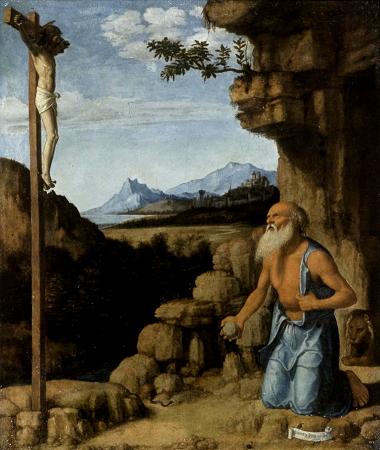Saint Jerome. Jerome was a Latin Catholic priest, confessor, theologian, and historian, commonly known as Saint Jerome. He was born at Stridon, a village near Emona on the border of Dalmatia and Pannonia. He is best known for his translation of most of the Bible into Latin, and his commentaries on the Gospels. His list of writings is extensive. The protégé of Pope Damasus I, who died in December of 384, Jerome was known for his teachings on Christian moral life, especially to those living in cosmopolitan centers such as Rome. In many cases, he focused his attention on the lives of women and identified how a woman devoted to Jesus should live her life. This focus stemmed from his close patron relationships with several prominent female ascetics who were members of affluent senatorial families. Jerome is recognised as a saint and Doctor of the Church by the Catholic Church, the Eastern Orthodox Church, the Lutheran Church, and the Anglican Communion. His feast day is 30 September. Eusebius Sophronius Hieronymus was born at Stridon around 347 AD. He was of Illyrian ancestry, although whether he was able to speak the Illyrian languages is a subject of controversy. He was not baptized until about 360-366 in Rome, where he had gone with his friend Bonosus of Sardica to pursue rhetorical and philosophical studies. He studied under the grammarian Aelius Donatus. There Jerome learned Latin and at least some Greek, though he probably did not yet acquire the familiarity with Greek literature that he later claimed to have acquired as a schoolboy. As a student, Jerome engaged in the superficial escapades and sexual experimentation of students in Rome; he indulged himself quite casually but he suffered terrible bouts of guilt afterwards. To appease his conscience, on Sundays he visited the sepulchres of the martyrs and the Apostles in the catacombs. This experience reminded him of the terrors of hell: Often I would find myself entering those crypts, deep dug in the earth, with their walls on either side lined with the bodies of the dead, where everything was so dark that almost it seemed as though the Psalmist's words were fulfilled, Let them go down quick into Hell. Here and there the light, not entering in through windows, but filtering down from above through shafts, relieved the horror of the darkness. But again, as soon as you found yourself cautiously moving forward, the black night closed around and there came to my mind the line of Vergil, Horror ubique animos, simul ipsa silentia terrent. Jerome used a quotation from Virgil, On all sides round horror spread wide; the very silence breathed a terror on my soul, to describe the horror of hell. He initially used classical authors to describe Christian concepts such as hell that indicated both his classical education and his deep shame of their associated practices, such as the pederasty then found in Rome. Although initially skeptical of Christianity, he eventually converted. After several years in Rome, he travelled with Bonosus to Gaul and settled in Trier where he seems to have first taken up theological studies, and where, for his friend Tyrannius Rufinus, he copied Hilary of Poitiers' commentary on the Psalms and the treatise De synodis. Next came a stay of at least several months, or possibly years, with Rufinus at Aquileia, where he made many Christian friends. Some of these accompanied Jerome when about 373, he set out on a journey through Thrace and Asia Minor into northern Syria. At Antioch, where he stayed the longest, two of his companions died and he himself was seriously ill more than once. During one of these illnesses, he had a vision that led him to lay aside his secular studies and devote himself to God. He seems to have abstained for a considerable time from the study of the classics and to have plunged deeply into that of the Bible, under the impulse of Apollinaris of Laodicea, then teaching in Antioch and not yet suspected of heresy. Seized with a desire for a life of ascetic penance, Jerome went for a time to the desert of Chalcis, to the southeast of Antioch, known as the Syrian Thebaid, from the number of eremites inhabiting it. During this period, he seems to have found time for studying and writing. He made his first attempt to learn Hebrew under the guidance of a converted Jew; and he seems to have been in correspondence with Jewish Christians in Antioch.
more...














